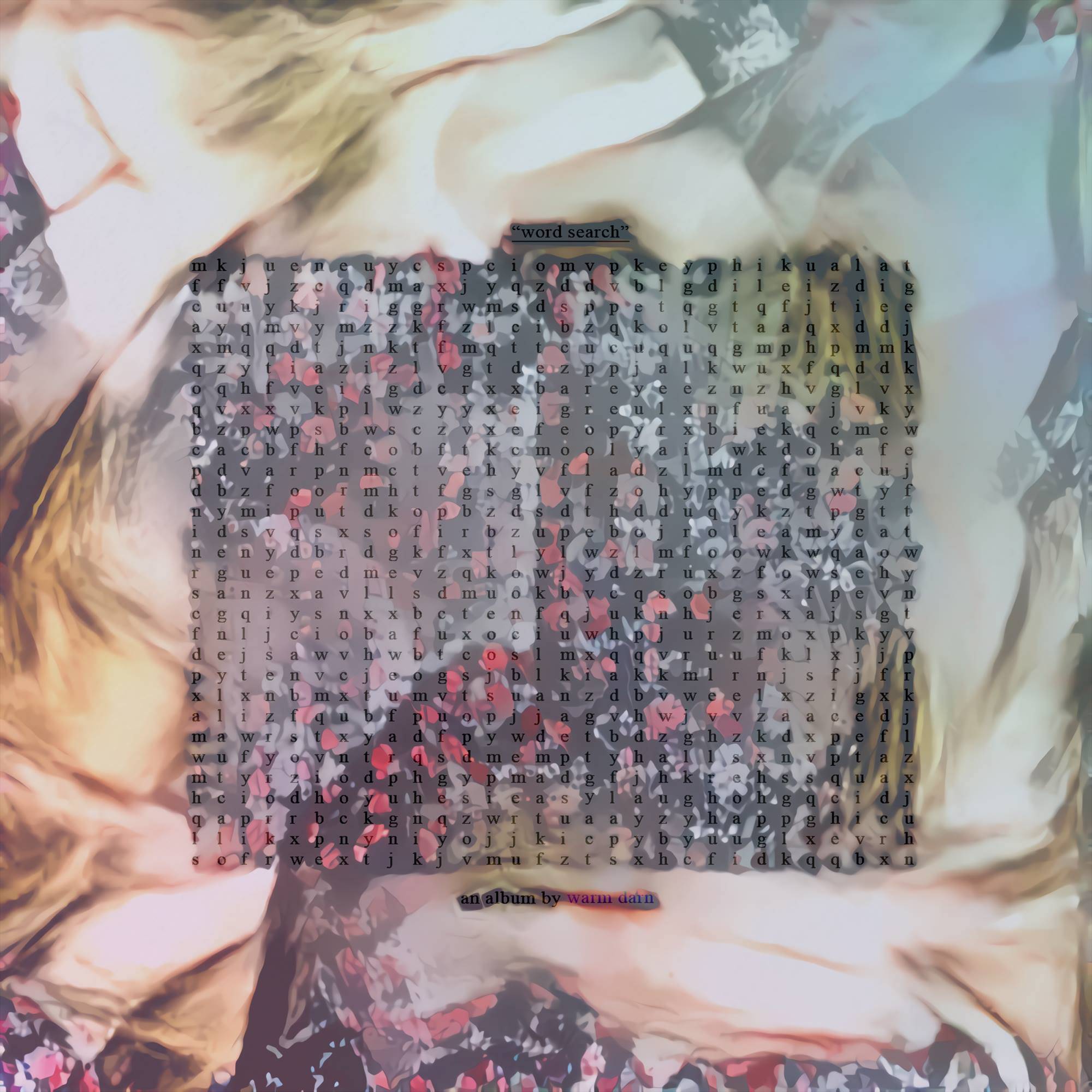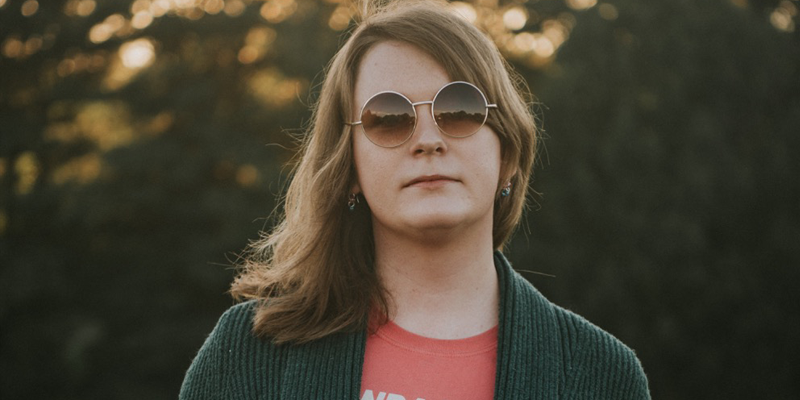We live in this age of technology so that one-person art-pop bands like Warm Darn can exist.
Created from the ashes of another cool, atmospheric band called Gogetum, Warm Darn subsists on a dreamy output of lush sounds that come from MIDI and heavily edited samples, according to the band’s 26-year-old songwriter and singer Colleen Deremiah.
The result is Word Search, which Warm Darn just released on Tuesday, January 29th.
Even the most casual of listeners will notice and likely appreciate the plethora of synth-savvy sounds on the album, from the foreboding-sounding first track, “Virtue in Vitro,” to more buoyant tunes such as “Key Player” and “Jeremy’s Bike.” The beautiful “Blanket Statement” (my favorite) features tuneful, lulling guitars with robotic vocals.
Deremiah constructs music via a laptop, creating sounds that are “doused in effects”—and is proud of it.
Smile Politely: Tell me about Warm Darn.
Colleen Deremiah: I have been writing and recording songs for about 13 years. Songwriting was my way to practice guitar chords. It didn’t take long to fall in love. However, my musical exposure was limited. I grew up in rural Piatt County without access to broadband Internet. My entire opinion of contemporary music was based on whatever I could burn from borrowed CDs, whatever my sister brought back from college, early 2000s rave music, whatever uncensored hip-hop I could hide from my parents, and an unhealthy obsession with The Beatles. I was ravenous for whatever there was to hear. This was the case until I came to U of I as an undergrad. I was surrounded by new sounds and ideas, but University coursework forced me to stop writing altogether, which eventually took a serious toll on my mental health.
SP: Who are your musical influences?
Deremiah: My understanding of what music could be shifted after Panda Bear played at Pygmalion [in 2014]. I had never seen anything like it. The music seamlessly blended together to create a visceral wall of sound. The vocals weren’t the focus of the music, nor were they a vehicle for lyrics. Instead, his voice was used as just another instrument in the mix. It felt less like he was performing songs and more like he was some kind of musical avatar, pushing buttons and twisting knobs to change the very atmosphere in the room. It felt very elemental.
Inspiration can come from anywhere. Grimes, CHVRCHES, Andrew Bird’s live material, the Postal Service, Aphex Twin, Dan Deacon, Sufjan Stevens’ Age of Adz, and Homogenic-era Björk were probably my biggest influences early on. I also use a lot of house production ideas, especially for my percussion. The swollen, emotionally pregnant synths of EDM artists like Deadmau5 or Bassnectar are also influential.
Shoegaze is another big influence. I try to bring the background elements of my music to the fore, much like Slowdive or My Bloody Valentine.
SP: What was the recording process like for the new album?
Deremiah: The songs on Word Search have had a long time to marinate. Part of my writing process is listening to stems on loop in order to get a feel for how they could be better and what sticks in my head. If it’s catchy to me, it will probably be catchy to others. Creativity is a deeply rewarding process. Writing this way also gives me a lot of freedom in when and where I work. The only tools required are the computer and some headphones. Many of the unused stems get recycled into live sets.

SP: What are some of your favorite songs on Word Search?
Deremiah: They’re all my babies. “Rest Assured” might be my favorite piece on the album. It is a personal track about learning how to learn from parents and hoping not to disappoint them in the process.
I am also fond of “Jeremy’s Bike,” a short, maximalist instrumental interlude in the middle of the album. I wrote it to try to capture the feeling of riding bikes out in the country with friends. Childhood summer nostalgia is something I poke at several times on Word Search.
“Empty Halls” is about abandonment, and about the realization that people don’t really change unless they want to. The shift from an album about childhood learning to one about learning in general happened gradually. Learning about life is a process that happens every day.
“Virtue in Vitro,” the album opener, is meant to set the tone and broadly examine my life flashing before my eyes. What if future people could replay their entire lives as a video? Would they share the snippets of the video with others? Would your funny or embarrassing moments give others the chance to learn? Part of this has already come true. So much of learning these days is done via the Internet. “YouTube Tutorial” looks at this reality from a hopeful perspective, unlike the beginning of the album. Each song is a different take on this idea, and the progression of the album is meant to convey my meta process of learning how to learn from my own experiences while simultaneously sharing with others in hopes that they learn something.
SP: Warm Darn’s album Songs About Transition is extremely raw, especially when compared to the polished sound of your other work. Why is that and what was the inspiration for that recording?
Deremiah: Songs about Transition is a mostly improvised acoustic recording from when I was just starting my gender transition. It was recorded in one take and stitched together later. It serves as a raw, unfiltered document of that place and time in my life. Transition can be a painful, messy process, and I was doing it without any help and almost entirely in secret. I released it for other trans people that might be looking for something relatable. I also love lo-fi acoustic pop-rock like early Cloud Nothings or Guided by Voices.
SP: I understand you’re touring in May. What are your live shows like?
Deremiah: Each live show is unique, and the sets are designed based on the available PA, room ambiance, and what I feel like singing. I use new samples, sounds, and unfinished material to weave tracks together, usually without stopping between songs. I try to use live video and lighting when possible. Live versions of songs are usually different from the recorded versions. Performing is an excellent opportunity to see what’s compelling in real time.
The responses to my shows have been encouraging, especially from the local queer community. Much of my work reflects the trans experience and its baggage. Everyone has their own reason to listen to music, but it seems like other queer people relate the most. I am endlessly grateful to everyone that has stopped me after a show to say thanks or to share a moment they found relevant to themselves.
Top photo by Adventure Hart Photography








